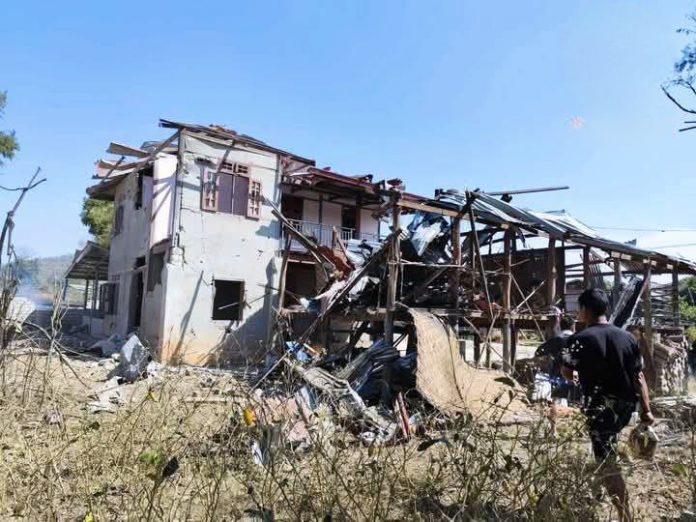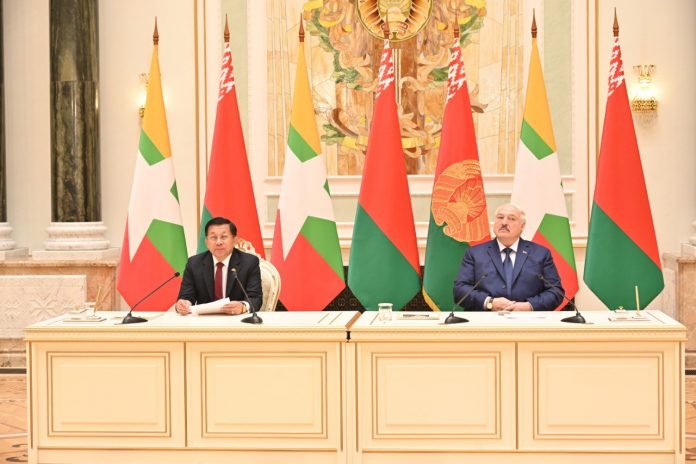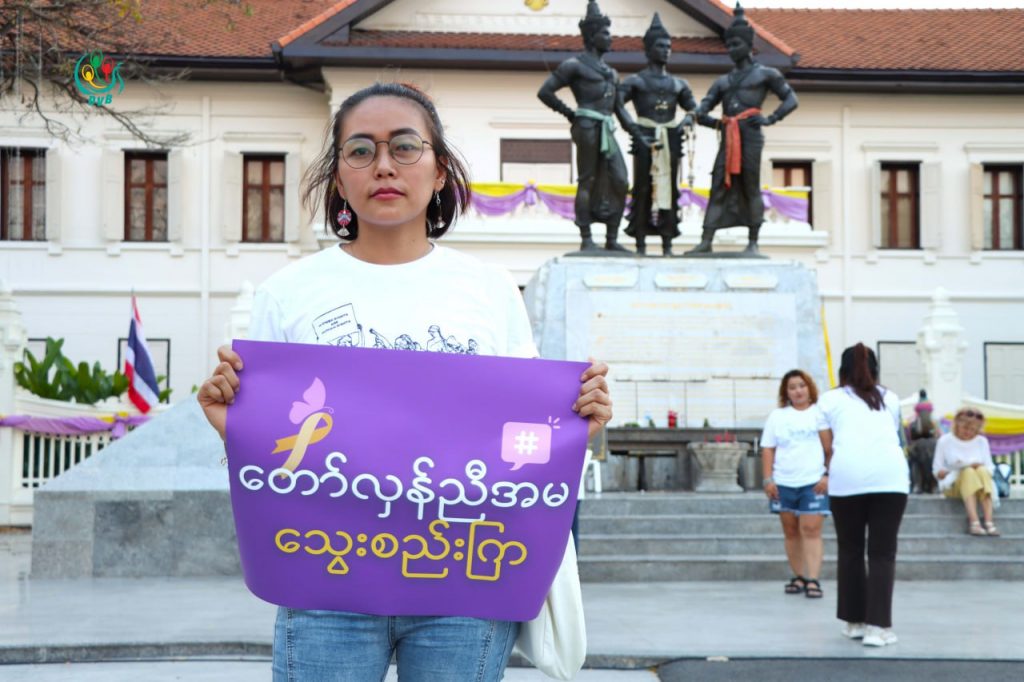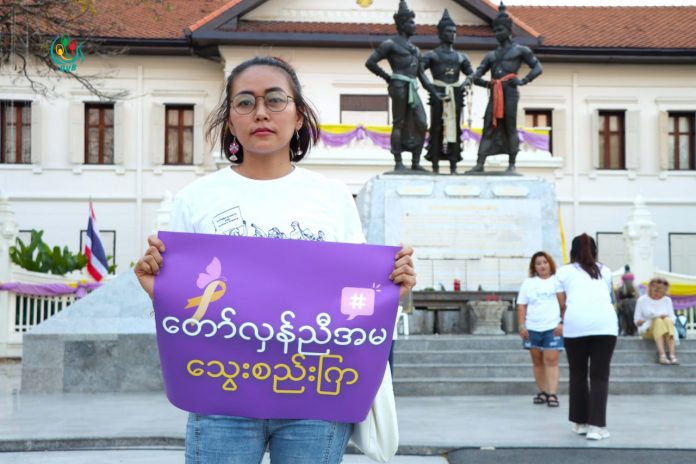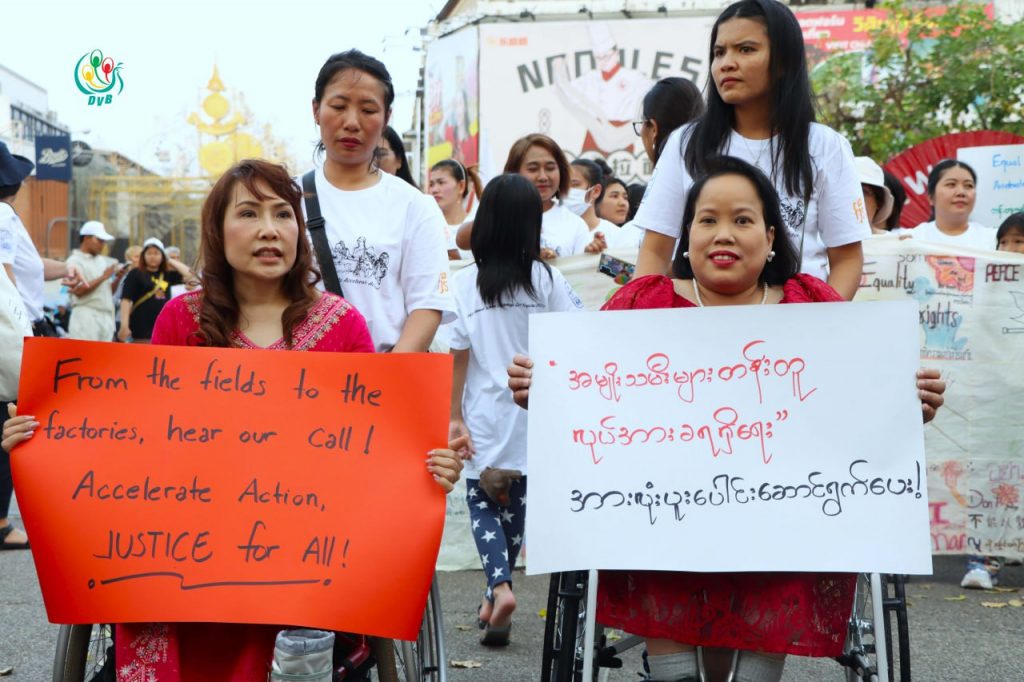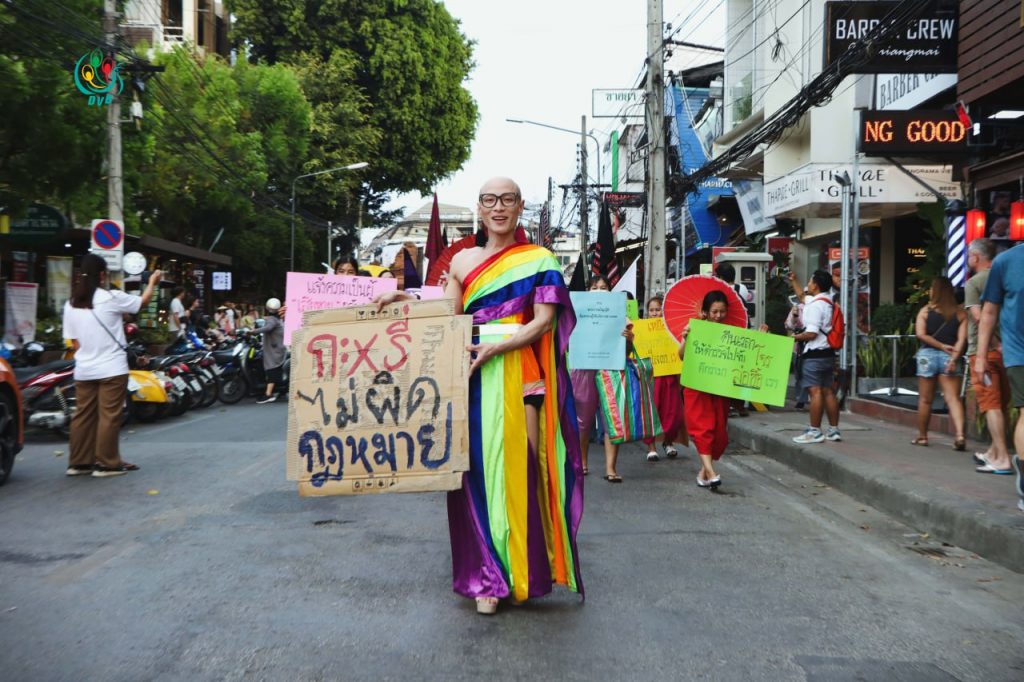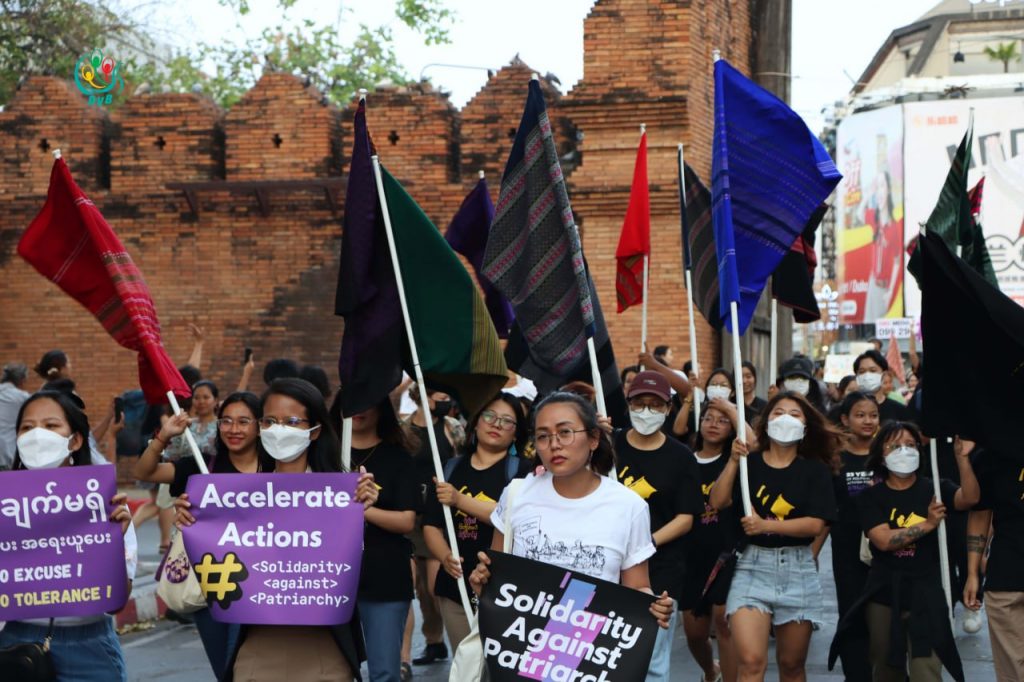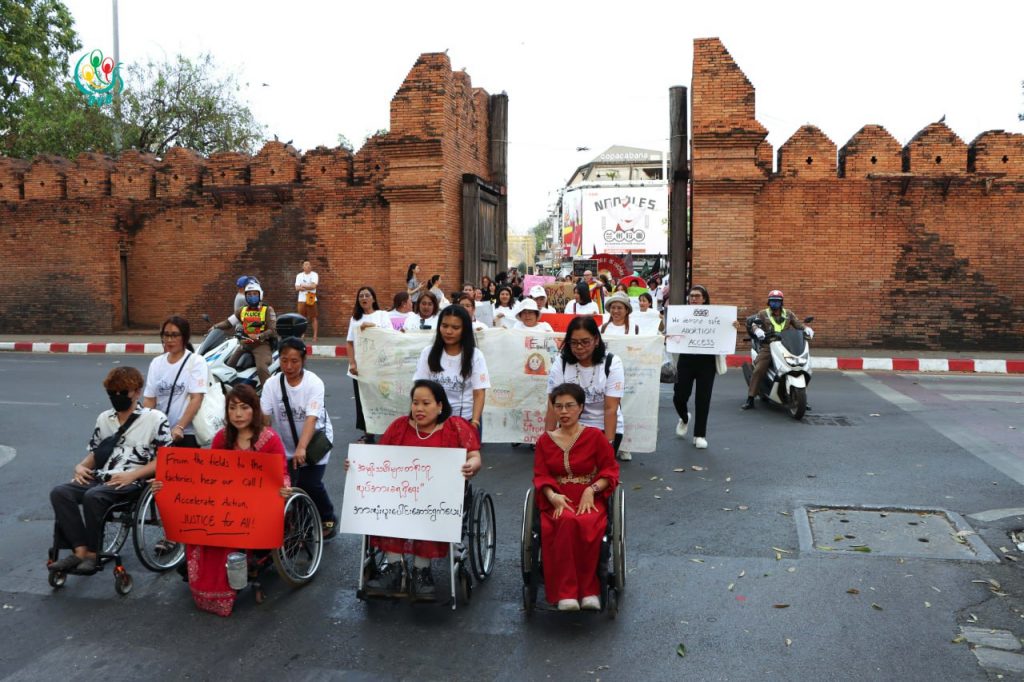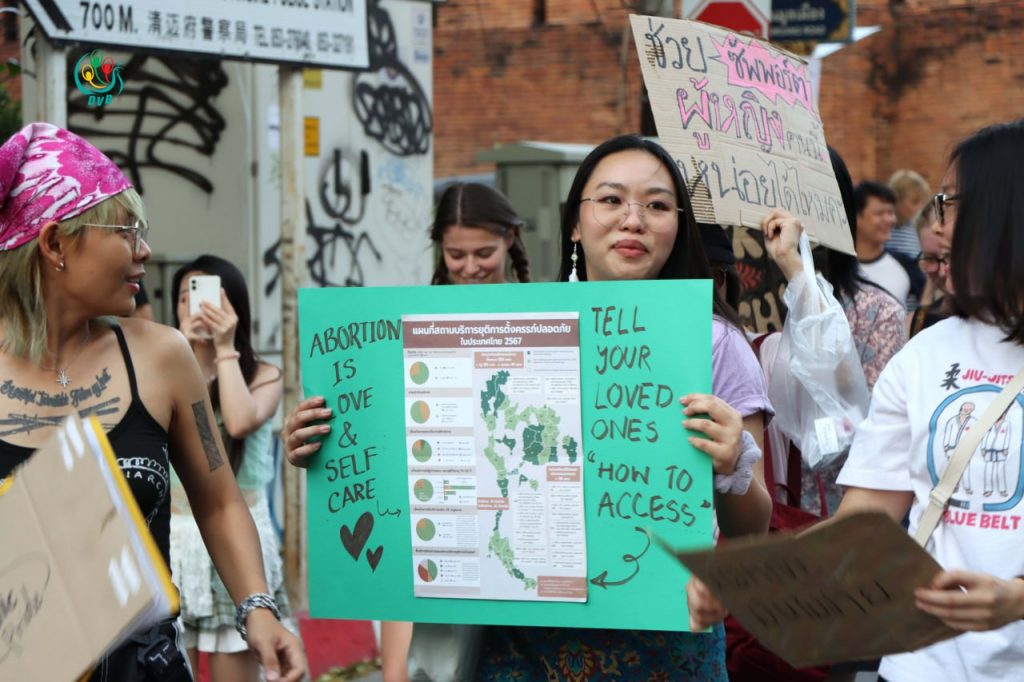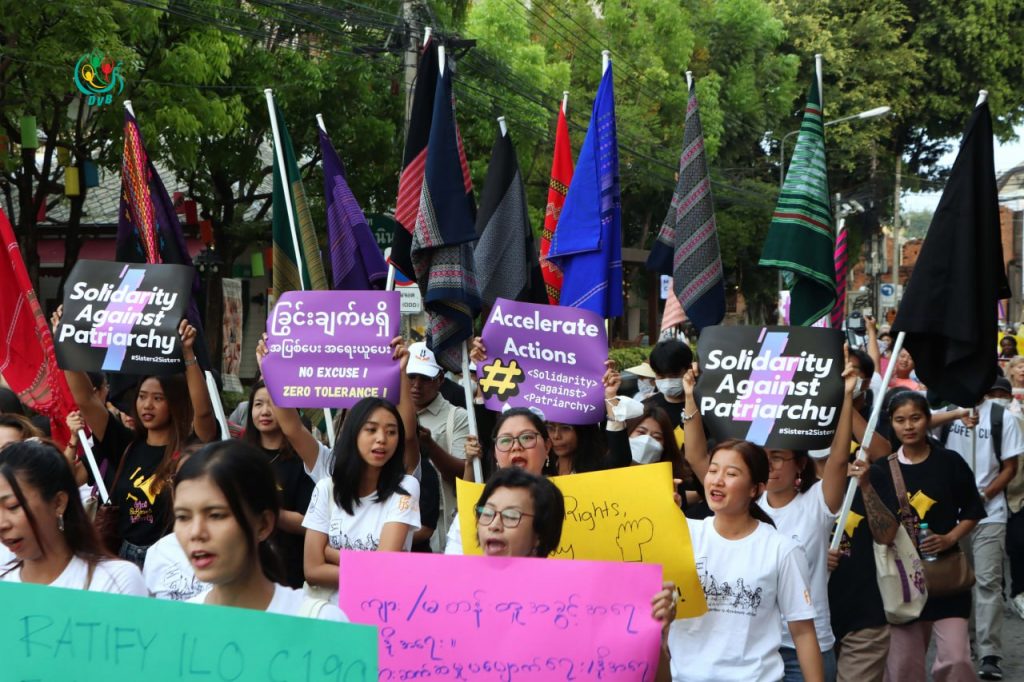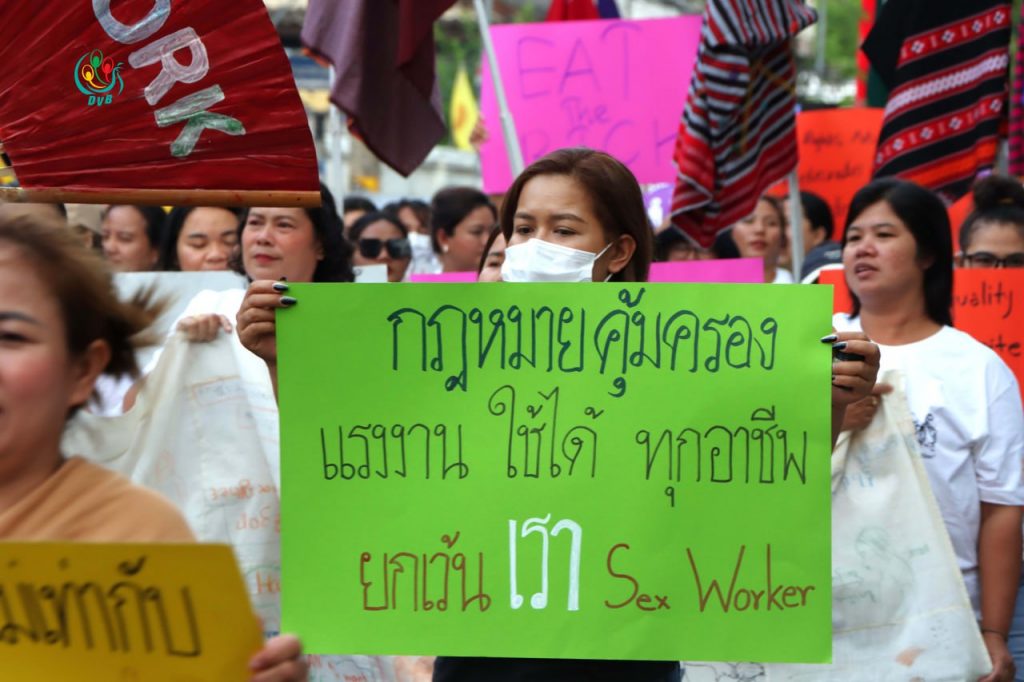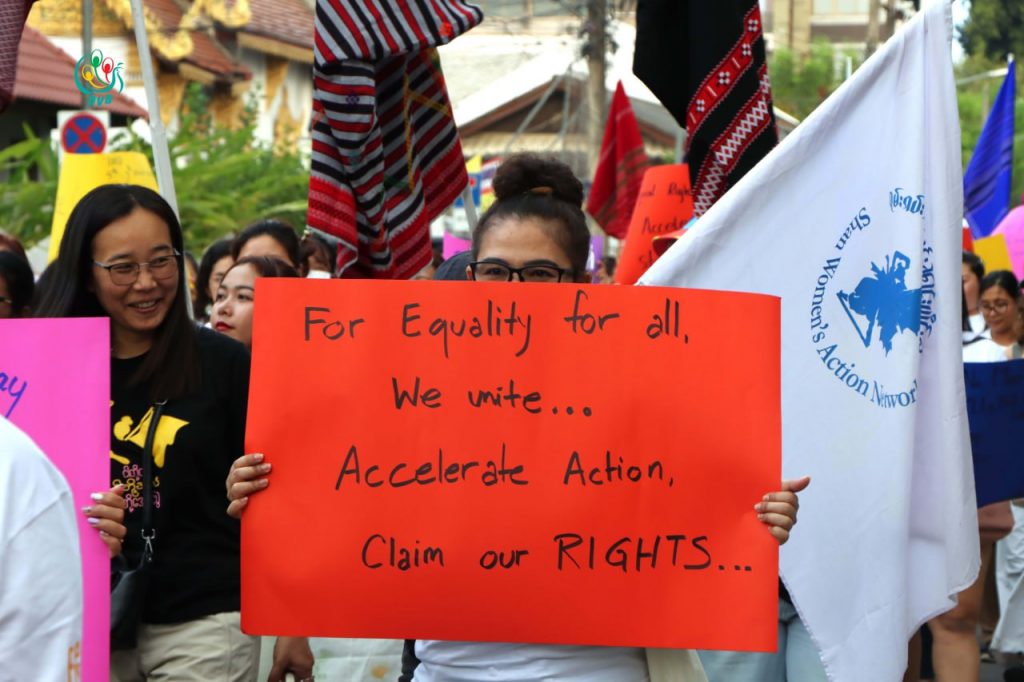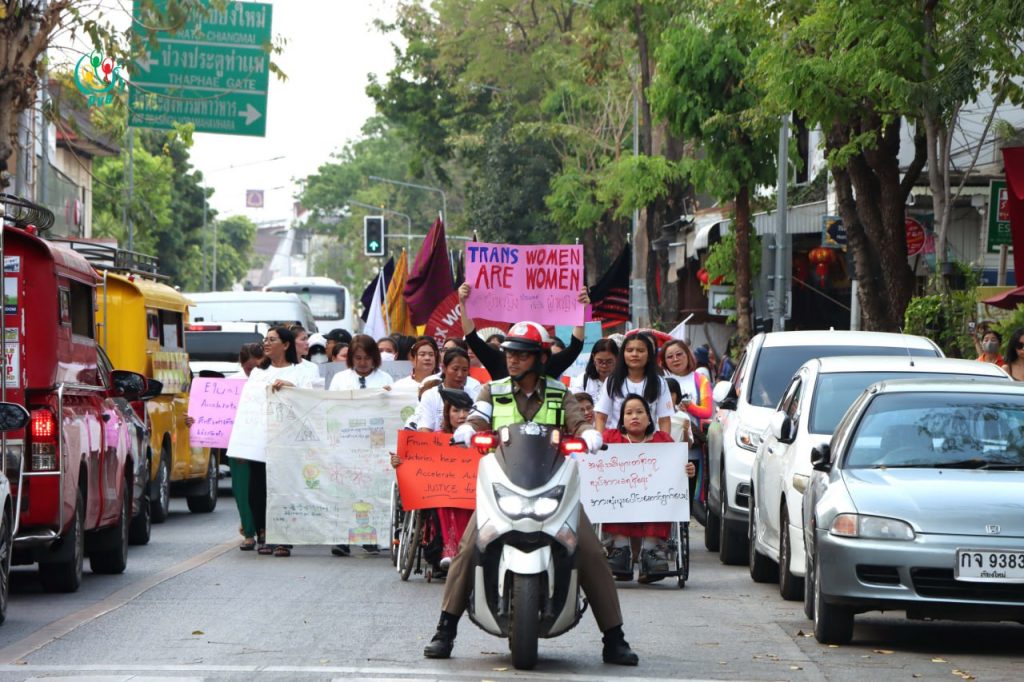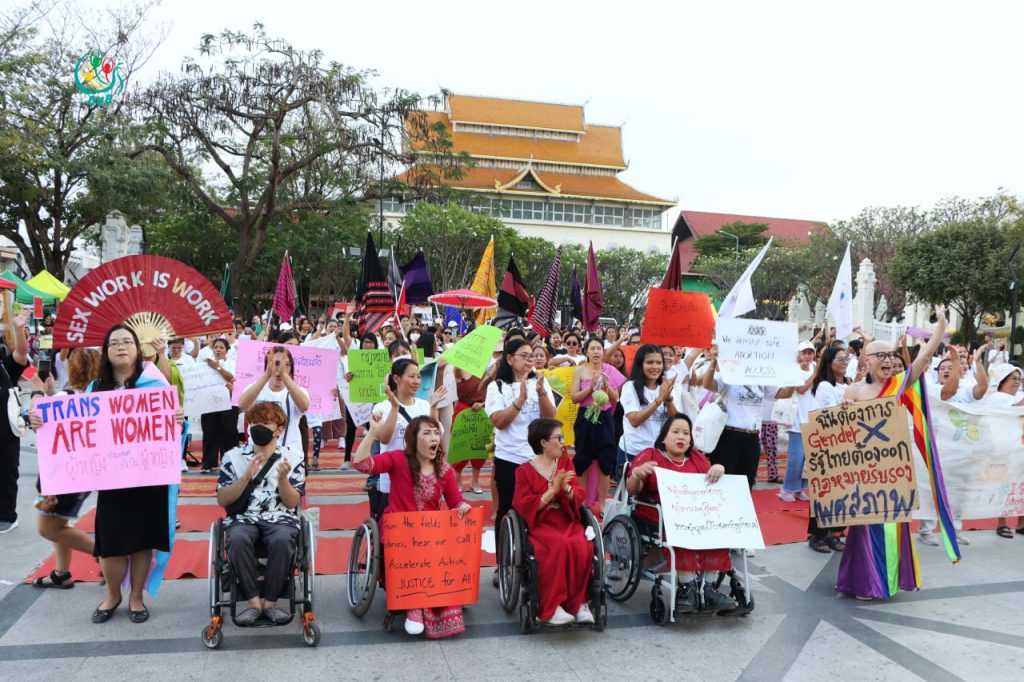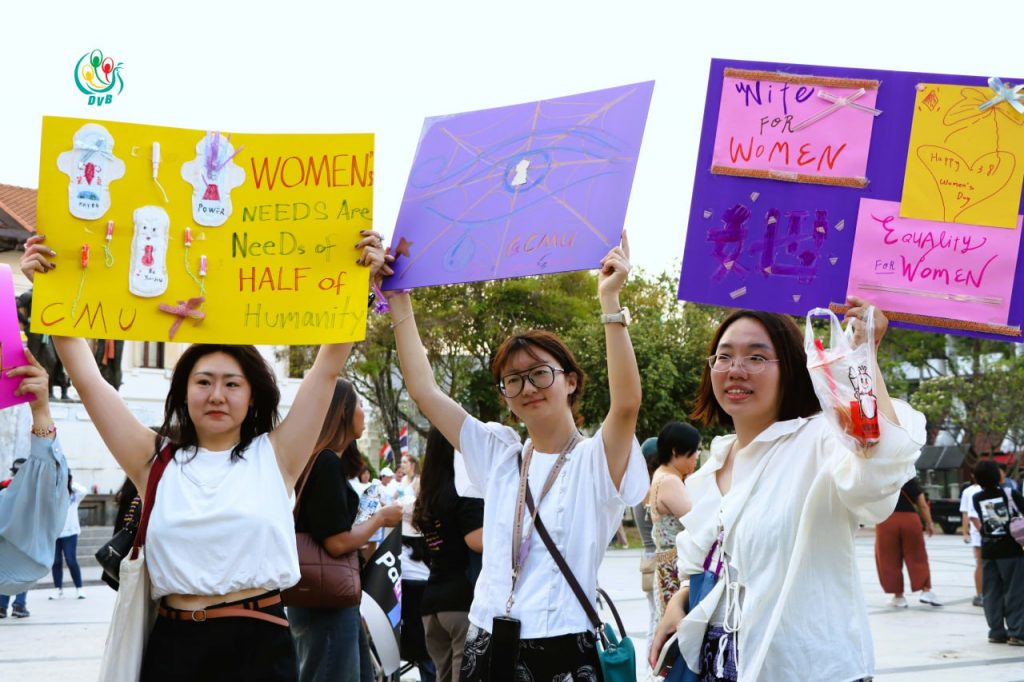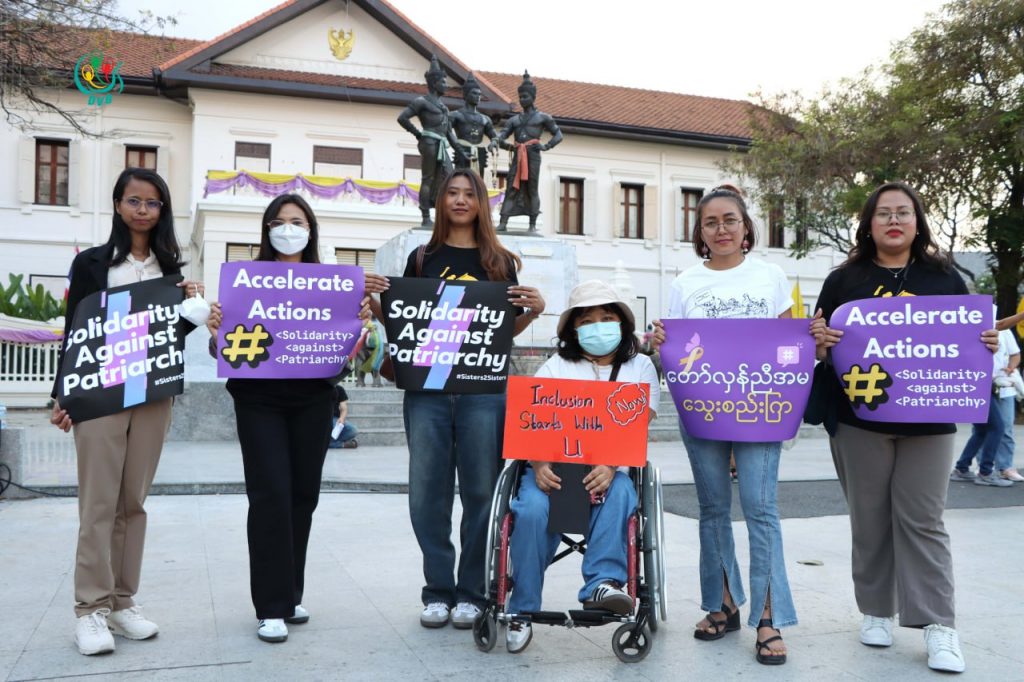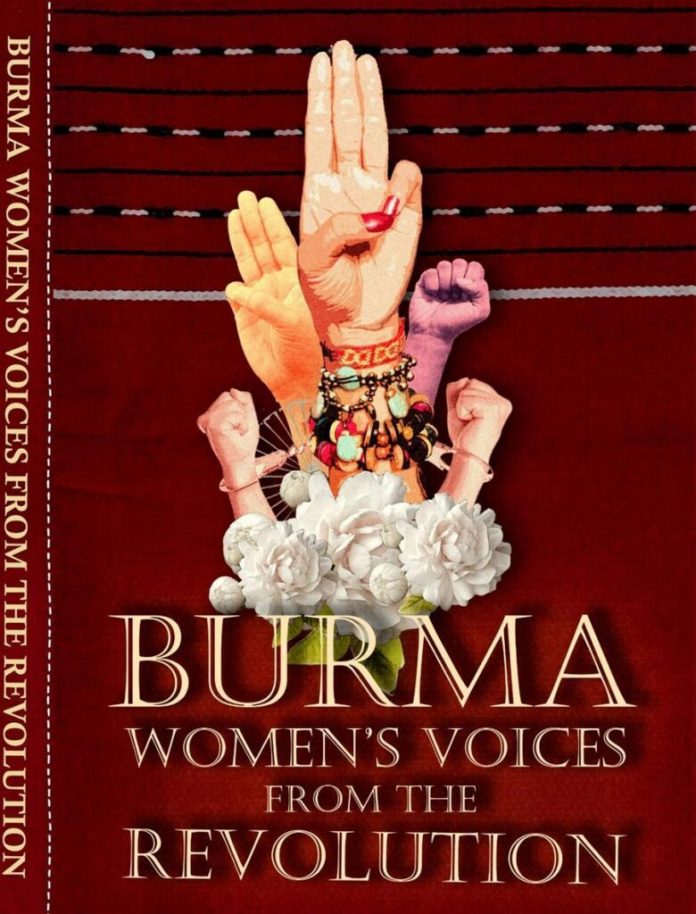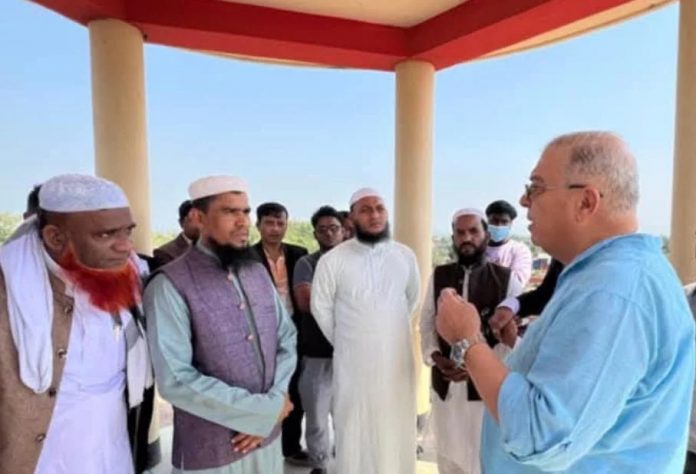To My Master
By Waso
“Casper… If you don’t come, I will eat your food.”
The section commander was at it again. Even though he would not actually eat the dog food, he always said the same thing whenever he called me for food. He never came up with anything new. I made a noise so that he would know that I was coming.
“Hey, your feet are dirty with red soil. Don’t get on the mat,” said Comrade Thar Din, as if he was apologizing to me. I am not sure if it’s because he was a former monk and only later became a soldier, but he always speaks politely. Comrade, you should know that my Master had never allowed me to have even a speck of dust on my feet before we moved to the jungle.
I looked at the rice with small pieces of bones that the comrades gave me, and I thanked them. Look at them, they always set aside some food for me, even though they don’t have enough meat for themselves.
I was thinking about my life while eating. My master used to give me one meal from a pet food shop, and another meal of rice and curry that he would mix by himself. Once a week, he took me to the spa and had me cleaned. I never dreamed I would become a ragged dog with red dust on my brown fur like you see now.
After I had my meal, I ran back to my Master.
“Look at this dog. He runs off as soon as he finishes eating.” The section commander said these same words every day and I didn’t care what he said. But he kept repeating the same thing.
The comrades didn’t complain that I stayed at the tree all day, where my Master was, and that they had to call me at mealtimes. They didn’t mind that I slept in their beds with my dirty feet. Sometimes, of course, they told me. But they already knew that even though they told me, I didn’t care. I only cared about my Master. I love them too. I love the children who always play with me. But I have to stay by my Master. I like how my Master would watch me fondly whenever I circle him with my tail wagging. I also like how people who passed by the tree where my Master and I were, would come and pet me and call out, “Casper, Casper.”
“The plane is coming! The plane is coming!”
A female soldier yelled as she carried me, running. I went with her quietly while I listened to the shortening of her breath. When the female soldier rushed, she squeezed me which hurt, but I didn’t dare to make a sound. I knew that pain is better than death.
I knew where she was running. It was to the bunker. When I got closer to the bunker, I looked back. Master, as usual, was the last person to run to the bunker. That Master was always like that. Children and women came into the bunker first. Then, the men came in. Animals, like us, were dragged in by whoever encountered us. Today, thanks to the fast-running female soldier, I arrived at the bunker early. When everybody was there, I heard the sound of heavy weapons “banging” outside. The bunker was shaking. We were shaking. I heard the strong heartbeat of the female soldier who held me.
After a while, everything went back to normal in the bunker. As usual, the soldiers would talk to each other, laughing about who ran and slipped. Running into the bunker became a daily routine. People were scared when they first ran, but once the situation calmed down, they started talking normally, and everything seemed normal. When they came out of the bunker, they were teasing Comrade Thar Din, who used to get scared whenever the plane came.
“Aren’t you ashamed that the media will write about you as a comrade who died while shitting his pants? Today’s news media is even reporting that soldiers have scabies. They’ll write about you shitting yourself and that you have scabies.”
The comrades were laughing loudly. Comrade Thar Din was also laughing and whispering, “I don’t have any scabies.” Then, I remembered my Master as I was hanging around them with my tail wagging. When I look towards the tree, as usual, Master was sitting by the tree.
As I ran to my Master, I complained to him. “Why are you always last when the bomb drops? Why didn’t Master run? Master, do you know how worried I am?”
“Hey, Casper. You are too noisy. You are small, but very loud when you bark!” a comrade yelled. I stopped barking. My Master smiled at me as usual.
My Master is quiet by nature. He doesn’t talk much. I arrived at his house because his mother brought me there. She bought me as a gift for my Master, and I still remember him smiling and taking me. My Master is one who smiles only with his eyes. After a while, the Master knew what I want when he looked at me. When I looked at my Master, I also realized what he wanted. As much as I was playing and running, the Master was calm. The reason why I often said that he was stable was that the Master was the calmest and coolest person I had ever met. Even comrade Thar Din, who was a former monk, was not as stable as my Master. I was really not happy that such a cool and good Master was living in the jungle suffering as a comrade. My Master was someone who deserved to find happiness where he belonged. It was same for the other comrades.
Today, the meal is noodle soup. I had meat yesterday, and I was satisfied. I don’t mind having noodle soup for the whole of next week. Do you know that my comrades have not eaten meat for about a week? So yesterday, they were eager for a hearty meal. Comrade Soe was so full, he ended up vomiting. When he did, I felt bad about the meat that had gone to waste.
How is your meal, Master? I know that your eyes are telling me that you are fine. But you know I want to ask you every day if you’re okay. Don’t worry about me. You know that I am always happy, right? Even you who was so reserved, opened up because of me. Don’t be shy. I will not tell others. You only live fully when we, two people, are alone with each other. Actually, not two people, I mean a man and a dog. You did what you wouldn’t do in front of others. Awww don’t get me wrong. I mean you sing and dance in front of me. I know you very well…
“Casper, come and take your little brother!”
When the conversation is going well, they always do this. As soon as I hear the word ‘little brother,’ I’m already running.
“Look at this guy, he can’t control himself whenever he hears ‘little brother’, ‘food’, or ‘going down the mountain’. Look at his style of running. Do you actually understand human speech? Come on, give me a big hug. I love you. Tell me if you love me. Here is your little brother. Will you still run to that tree when I let you go? I won’t let you go. I will hug you tight. I’ll keep you close!”
When I play with comrade Pi Si, he loves it if I pretend to bite his hand and lick it with my tongue. Comrade Pi Si loves me very much. He calls himself Ko Gyi (elder brother) and he kisses and hugs me from time to time. He travels frequently, so he is not always at the camp, but every time he comes back to the camp, he always brings something for me. ‘My little brother,’ which he said was Casper, the ghost doll from the cartoon movie. The doll is made of cotton. I held the white doll in my mouth and ran back with it to my Master.
Master, do you remember? When Master first bought me a Casper doll, I destroyed it, so you bought another one right away. I also bit and destroyed that one too. I stopped biting the third doll because I didn’t want to bite it anymore. Some visitors to your house said that I didn’t bite my Casper doll and maybe this was because we both looked alike. At that time, you looked at me half laughingly, telling with your eyes that the guests didn’t know the story that I had already destroyed the first two dolls. We had brought the third doll up to this camp. Two weeks ago, the toy was destroyed in the bombing, so now comrade Pi Si bought me another one.
So, this one is the fourth one. Tonight, I’m going to sleep hugging this doll. You are happy too, right Master? I know that you are also happy even if you don’t say it out loud.
“Planes are coming… Hey, Mya! Check the children, dogs, and cats. Make sure no one is left behind. Run. Quickly run!”
When I heard the comrades yelling about the planes coming, I ran to the section commander and woke him up. While the section commander was shouting orders, he handed me to Ma Mya. This time, there were several planes. The comrades were in the trench arguing about the planes. It was around midnight and they were arguing about what they saw, and it was quite noisy.
“It was a Mig-29. Don’t you see two exhausts?”
“No, there was only one exhaust. It must be a Thunder. Didn’t you see?”
“There are two exhausts, and two tails too. I saw them with my own eyes.”
“Thar Gyi, there was only one exhaust and one tail. Don’t bluff. There was a triangle on the tail, very obvious.”
Aww comrades, why are you all arguing? If we are hit by a bomb, we will die no matter what kind of plane it is. I just realized that my Master hasn’t arrived yet. The louder the noise outside, the more worried I became.
“Hey there, Casper. He is going near the entrance of the bunker. Someone, take him. Give him to someone in the corner. Give him to Ma Mya over there. Ma Mya can hold him while she sleeps.”
The comrades are very good at choosing people. I, who often want to run to the entrance of the bunker, will only be quiet with Ma Mya. Ma Mya can hold on tightly to anything that gets into her hands. Even the section commander could not get away from her. While I was sleeping beside Ma Mya, I woke up to check if it was my Master whenever I heard any sounds. But I couldn’t get up as Ma Mya didn’t let me go, though she relaxed her grip a little when I moved…
Ma Mya was preparing mutton curry and rice for me, a birthday donation from a civilian supporter. She looked at me fondly while I wagged my tail around her.
“Son, are you hungry? Mom is still mixing the food. So, wait a minute. I will give my son a lot of meat today.”
Ma Mya not only mixes my food and gives it to me, but she also enjoys watching me eat, smiling as I do so.
“The plane is here. The plane is here, hey!”
When I heard the plane, I jump onto Ma Mya. Ma Mya carries me and runs to the trench. When I tried to look back between her arms, I saw my Master standing beside the tree. The plane was heading straight for the tree where he stood. While running, Ma Mya’s grip relaxed a little as I was moving, and her body shook. The plane was approaching the tree. Master! Master!
I jumped out of Ma Mya’s arms and ran towards my Master, leaving all the sounds of comrades and Ma Mya behind. “Oh! Casper. Casper. Casper escaped!”
“Run, Ma Mya, run. Don’t stop. One of the comrades from the back will bring Casper.”
While I was running, I hear “Bang!” the sound of an explosion in my ears, and my whole body went up in the air. When I fell back, my Master caught me and held me in his hands.
My Master could hold me. Look! I could also touch my Master. When I licked the face of my Master, my Master laughed loudly. It was a very happy moment when I looked at my Master laughing. His touch was very soft as he stroked my fur with his hands.
—–
“Casper…. My dear… How can I bear this, my son.”
The comrades soothed Ma Mya, who was crying, holding my dead body. Children were also crying. Don’t cry, Ma Mya. Don’t cry, children. Hah, comrade Soe and comrade Thar Din. I am here. I am with my Master. Comrades, don’t cry. I just now realized how much you love me. I thank you all. The spirits of me and my Master will always be here at the tree. You can come to the tree when you miss us. You also should take care of yourselves. And by the way, please also take care of my little doll brother, Casper…
Waso is currently working as an editor and producer at Federal FM Radio. She produces audio stories, programs like The Voice of Women Revolutionaries, Mine Risk Podcasts, Look to the Sky Podcasts, children’s storytelling programs, and radio interviews. Additionally, she has written stories to raise awareness about the dangers of landmines, unexploded ordnance, and airstrikes.
The story To My Master is based on the experiences of revolutionary fighters in Karenni State. The dog Casper, who inspired this story, is still residing in Karenni at present.
String
By Pyar Tho
“Hey, you two haven’t made the bed yet? It’s already half past nine.”
“Ma, if you want to sleep, you can do it yourself. Thee (we) are not sleepy yet.”
The two of them answered my question at the same time, they didn’t even look at me. My twin sisters were both passionately reading a comic book. Just when they were about to finish primary school, COVID-19 broke out, and schools were closed. The schools only opened again after the pandemic when they were about to start middle school, but then there was a coup d’état and they could not go back to school again for a year.
Our mother was against the military coup and joined the Civil Disobedience Movement (CDM). She thought that not going to school was an act of resistance against the military, so when school had reopened, as a member of the CDM, my mother refused to send them to school.
Instead, she sent them to receive private tuition and told them to continue with their education. In the afternoon, they had to join an English class, so the two of them watched a movie in the evening or just read cartoons. Unlike other kids, they were not allowed to use mobile phones for a long time due to my mother’s prohibition. My uncle sometimes brought in collections of old cartoons and journals. On those days, you can’t split the two of them up, they would read a comic book head-to-head. Sometimes, when the light went out, they still read by lighting a candle. Once, they burned their pillow.
“If you come and sleep only after I have made the bed, I will fight you,” I said impatiently and walked to the back of the house. I felt their gaze on my back. As usual, I’m sure they would be staring at me like they had never done anything wrong.
It had been a busy day since I had to spend more time at work in the early days of the month, concluding the work of the previous month. After the busy day and overtime at work, when I came back home, the buses were overly crowded. I couldn’t get on the bus from Sule to South Okkalapa, so I had to take the bus via North Okkalapa. I really struggled with being tired, so I had to hold myself together to get back home. I had planned to go to bed as soon as I got home, but when I got there, I found out the twins had not even made the bed.
“Mom, do you see? Your two daughters don’t even make the bed by themselves if I don’t do it for them. Even though I come home so tired, I still have to do these things for them. It makes me so angry.” I was frustrated and complained to my mom in the kitchen. I believed she would tell me to forgive them.
“They got new comic books, didn’t you see that when you came in? I don’t know where they got them. They were reading and laughing. They didn’t even have dinner.”
Although my mother told me to shower and then come and have dinner, I just wanted to shower and then go to bed as fast as possible. Few people were outside on the streets due to the 8:00 p.m. curfew imposed after the coup. We frequently heard news that the military had shot drivers who were found on the street after 8:00 p.m. Besides that, in less crowded areas, people were being killed and cars being looted if they were with the cars. Those without cars often faced beatings and had their phones and money stolen. So, even when the military announced that the curfew order had been lifted, people were still not leaving their houses after nine o’clock and went to bed at around 10.
When I went into the room to make the bed, the twins were not there. I could hear their voices whispering and laughing in front of the house. So, the twins were in front of the house then. They would often fight each other for many different reasons, but when watching a movie or after getting a comic book, the two would get along very well. Now, I don’t know when they will fight again.
I dusted the mattress and smoothed it out for the bed sheet. A small yellow tube of paint fell out with a clinking sound. I use oil paint for painting, but why was this tube here? Thinking carefully, I picked up the tube and saw that it was thin and crooked. I remembered that I had bought a new box of oil paints yesterday and rummaged through the paint tubes in the corner of the room. But I didn’t see a yellow tube. I looked for it between my paintings but again, I couldn’t find it. Right, it must be the twins.
Paintings – I love painting. Because my Papa is a painter, others say that I follow a legacy. I really like to paint alone. When my Papa looked at my paintings, he would praise them and tell me what needed to be corrected. As for the twins, ever since they were young, they copied everything I did. Papa would often smile and say, “It’s just the twins, daughter. They are just doing what you are doing, they are not really interested.” But it doesn’t matter what they think, my new tube of paint was gone. I had to call the younger one. My younger sister could not keep secrets, so the ringleader must be the older one. She was quite secretive and would always say that they didn’t do anything, or they didn’t know. I was sure she would deny it.
“The black short person, Gotakala. Hehe, It must be about Ma.”
“Yes. Hehehe.” I could clearly hear the two whispering and laughing. They called me “Ma.” Twins don’t use their pronoun as “we,” they often use their pronoun as “Thee”. They also don’t call me “sister”. Instead, they call me “Ma.” They are seven years younger than me, but this year when they turned fourteen, they were the same height as me, but my skin is darker than theirs. When others talked about how dark I was compared to them, they tried to protect me and they fought for me. But now, they called me short and dark-skinned. When I had found out they had used up the whole new tube of expensive paint, that wouldn’t have made me angry. But now, when I heard them making fun of me, I got angry.
“Hey, you two, I heard all you said! What about the dark-skinned, short person? You two used up my paint, right?”
As soon as they heard me yelling, the squealing and laughter outside stopped. Mom ran out of the kitchen wondering what had happened.
“Who said that, Ma? We didn’t say.”
I was not sure if it was the older or younger one. One of them was shouting from in front of the house. It was a voice of a person who didn’t want to admit what they had done, even though they had been caught redhanded. I felt like the younger girls were trying to fool the older sister. I was getting angry.
“You guys are screaming at half past ten at night, amid bad times!” My mother told us to stop, she was half-yelling and half trying to solve the problem.
“The two need to go to sleep. You should be more understanding of your sister who is tired from work. You are not children anymore. Tomorrow, make your own bed. Up until now, your sister has had to do everything. When you are reading cartoons, I can’t ask you to do anything. You change clothes three times a day – not only one, but both of you. You two also eat more than others…”
After yelling at them, my mother went into her room. I didn’t know if she had been planning to scold them about all this anyway or if she had yelled at them on my behalf. She continued muttering in her room. Although I was angry, I finished making the bed. In the past, I had to carry the twins one by one to the bed after making it. Sometimes, they pretended to fall asleep, then they would shout “hey…” and run out of the room after I put them on the bed. It made me very angry when they did this. This time, after I switched off the light and tried to go to sleep, the twins quietly came into the room.
“Hey, I’ve already told two of you not to sleep with me. Go. Don’t sleep on the bed I made,” I told them.
“Whatever! We will sleep here anyway.”
“What’s wrong with sleeping in our bed?” The twins said one after another. I didn’t know if it was because I was so tired, but that day I was more irritable. It seemed like I wanted to beat both of them. My angry tears spilled over onto the furry toys next to me. I bought those dolls as birthday presents for the twins’ birthdays. I grabbed the dolls and tore them apart, then pulled out the cotton wool as I got more and more angry. On the bed, the dolls and cotton wool, which were ripped open, were scattered. If it wasn’t for these dolls, I would have beaten them both. They were the same size as me, but they’ve never fought back. I knew that if I beat them, they would just let me. But I didn’t want to do it, so I took out my anger on the dolls instead. The two twins were looking at each other with openmouthed surprise. Suddenly, they didn’t know what to do and lost their composure. They were nearly crying.
“Mother, Papa, Ma has torn the dolls!” they cried and ran out of the room. I could hear crying outside and then heard Mom and Papa trying to soothe them. But later, I fell asleep hearing no more coaxing voices. At dawn, I woke up alone in bed. It seemed that the twins did not come back to the room that night but slept in Mom and Papa’s room. The sun was already quite high, but it was my day off which meant I could sleep in luxury until now. If I was with the twins, I wouldn’t have been able to sleep in until then. Usually, when they woke up, they looked at each other’s faces and laughed for no reason. When they did that, how could the person next to them could continue to sleep?
I was still in primary school when they were born. Because there were two children born at the same time, both my parents had to take care of them. That meant Mom and Papa couldn’t send me to school anymore. But, as it was not far from home and was on the same road, when I walked to school, Papa often stood in front of the house holding my younger sisters until I entered the campus.
Before, I slept alone in this room. Then one day, when they were in fourth grade, they came to my room, saying that they would no longer sleep with our mother. At first, I thought they would come and sleep for one or two days. The next day, they brought their clothes and said they would stay here. That’s when I had to say goodbye to my single bed. My mother sold the bed and bought a thin mattress for the three of us to sleep on together. I had to lay out the bedding, dust the mattress, and put the pillow in their place, so I could no longer throw myself on the bed like before. From that day on, I had the job of making the bed and putting it back in the morning and carefully sticking it in the corner of the room.
I had the extra work of keeping my things and valuables safe. If I forgot something and left it lying around, it will be lost or destroyed. If I asked carefully, I could still identify the perpetrator when they were young. Now, the two are teaming up and trying to keep secrets. Because our bodies are similar in size, if I buy something, they both also want it. If I buy something for myself and not for them, both of them would be unhappy. Even if I wanted to buy a blouse, I would have to save up money and buy one each for the three of us. I started buying three pieces of everything. One good thing about both of them is that I could keep my beauty products safe. I bought cosmetics for us all. Although they knew that the cosmetics I used were more expensive than theirs, they never tried to use mine. I should thank them for that.
When I got up to clean the bed, there was some cotton wool next to me. Yes, of course. Last night, I tore apart the twins’ dolls and threw the cotton wool around. I thought about it and felt sad. At night, I was angry, so I did those things in a blind rage. Did they clean up the broken dolls? I don’t know if Mom and Papa had cleared it up, but they were no longer in the bed.
I got out of bed, washed my face, brushed my teeth, and sat at the dining table. Three packets of sticky rice were on the table. As my mother poured the tea, she told me about how the twins cried so much last night that they couldn’t sleep. They packed the broken dolls in a plastic bag and placed it near the dining table. They said that they would sew the dolls by themselves.
I took one sticky rice packet on the dining table.
“Who’s left to eat, mother?” I asked
“Twins,” said my mom. I divided the sticky rice from my package into two parts and set aside half for myself. I divided the other half equally and put it in the packages that the twins would eat. I can’t even finish a regular packet of sticky rice, so I usually give the twins half of mine. They are happy when they see a lot of sticky rice in their pack. They can eat it all. Sometimes I ate all my share and didn’t share it with them, then they got angry.
“Are the twins not awake yet?” I asked.
“They have been awake for a long time. They got up early and went out with your Papa to queue for oil,” my mother said while putting an egg into the fried beans. Right, it had been announced that the cooking oil truck would come today. The twins woke up before 7 a.m. to line up with Papa. At 9 a.m., the oil truck had arrived, so my mother said that they would be back shortly. She continued about the fact that people couldn’t even buy palm oil in the market, the cooking oil was only available for 4500 kyat if they queued. Some of them stood in line and resold what they bought for 4500 kyat for 8000 kyat. While cooking, my mother kept saying that she would buy good rice even though she couldn’t buy good quality oil. The price of cooking oil in shopping malls was already above tens of thousands per liter.
Manual laborers and wage earners like us must buy cheap palm oil. At the moment, because the price of palm oil had gone up, the army was controlling the market, and the cooking oil trucks were selling it at low prices. People had to bring the household list to the ward administration office to get a token card. After this, we had to queue to buy the oil with that card. Although one card was for one household, some people who could afford to buy with the market price didn’t take the card, or gave the cards to their neighbors. We also got a card from the house next door, so, Papa had one card and the twins had one card when they lined up to buy the oil. The staff at the ward office didn’t need a card to buy oil, but she had 5-viss containers of oil at her house. That makes you think about how corrupt the situation is. From staring at my mother’s back while she was cooking, my eyes turned to the clock on the wall. It was already 9 o’clock. I finished drinking the rest of the tea that was left in the cup, then stood up from the dining table, picking up the bag of broken dolls.
“Hey, what are you going to do now?” my mother asked me in a worried manner.
I answered, “the twins are coming back soon. I will sew their dolls before they come back.”
Pyar Tho is serving as an editor and producer at Federal FM Radio. She has been involving in broadcasting programs such as One-Minute Federal and Radio Edu. At present, she is producing programs including the Youth Line Podcast, radio dramas, Islamic Teachings, radio interviews, and children’s storytelling programs, as well as diarythemed shows. “String” is based on her personal experience. The characters in the story are currently living in Myanmar.
This International Women’s Day, ALTSEAN Burma launched a groundbreaking book called Burma Women’s Voices from the Revolution, which is a collection of writings by first-time writers from Myanmar. This new book is a powerful testimony to women’s resistance to military rule and control and against the oppression and sexual violence faced by women in militarized societies.


